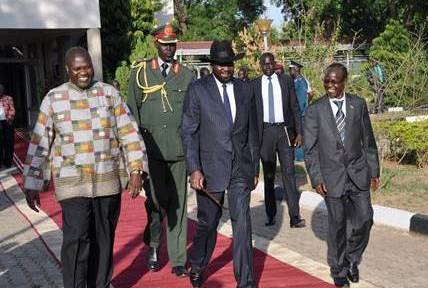South Sudan forms transitional government of national unity
April 28, 2016 (JUBA) – Four factions of the South Sudan’s former warring parties and political rivals, turned peace partners, have finally formed the long-awaited transitional government of national unity (TGoNU) to administer the country for the next two and a half years, pending elections.

The war, which has killed tens of thousands and displaced millions more, erupted on 15 December 2013 in the national capital, Juba, when internal debates over political and institutional reforms within the leadership of the ruling party of the Sudan People’s Liberation Movement (SPLM) turned violent.
In accordance with the implementation of the power sharing deal in the Agreement on the Resolution of the Conflict in South Sudan (ARCISS) brokered by the East African regional bloc, the Intergovernmental Authority on Development (IGAD), and its continental and international partners, the rival parties agreed to form a unity government and implement reforms in the country.
The rival parties include the government led by President Salva Kiir, the armed opposition faction of the SPLM-IO led by First Vice President, Riek Machar, the Former Detainees (FDs) led by the now appointed Foreign Minister, Deng Alor Kuol, acting chairperson on behalf of Pagan Amum, former SPLM Secretary General, and Other Political Parties (OPPs) led by Lam Akol, Chairman of the Democratic Change (DC) party, who also chairs the alliance of opposition political parties in South Sudan.
Each faction nominated officials who have been appointed to the ministerial positions based on the number of ministerial portfolios allocated in the power sharing deal in the new 30-member cabinet, where the government or SPLM-IG has 16 national ministers, SPLM-IO, 10 national ministers, FDs, two, and OPPs, two. This is in addition to a number of deputy ministers.
Names of the nominees were submitted to President Kiir by each faction, which he decreed on Friday as the new cabinet.
In the decree issued on Thursday by President Kiir, appointing the unity government, the new 30 ministers include 1) Martin Elia Lomoro, minister of cabinet affairs, (OPPs), 2) Deng Alor Kuol, foreign affairs and international cooperation, (FDs), 3) Kuol Manyang Juuk, defense and veterans affairs, (SPLM-IG), 4) Alfred Ladu Gore, minister of interior, (SPLM-IO), 5) Paulino Wanawilla, justice and constitutional affairs, (SPLM-IG), 6) Obote Mamur Mete, minister in the office of the president for national security service, (SPLM-IG), 7) Peter Bashir Gbandi, parliamentary affairs, (SPLM-IG), 8) Michael Makuei Lueth, information, communication, technology and postal service, (SPLM-IG), 9) Richard K. Mulla, federal affairs, (SPLM-IO), 10) Mayik Ayii Deng, minister in the office of the president, (SPLM-IG), 11) David Deng Athorbei, finance and economic planning, (SPLM-IG), 12) Dak Duop Bichiok, minister of petroleum, (SPLM-IO), 13) Taban Deng Gai, mining, (SPLM-IO), 14) Lam Akol Ajawin, agriculture and food security, (OPPs), 15) James Duku, livestock and fisheries, (SPLM-IG), 16) Stephen Dhieu Dau, trade and industry, (SPLM-IG), 17) Dhieu Mathok Diing, energy and dams, (SPLM-IO), 18) John Luk Jok, transport, (FDs), 19) Rebecca Joshua Okwaci, roads and bridges, (SPLM-IG), 20) Josephine Akoon, environment and forestry, 21) Mary Alphone Lodira, land, housing and urban development, (SPLM-IO), 22) Mabior Garang de Mabior, water resources and irrigation, (SPLM-IO), 23) Jemma Nunu Kumba, wildlife conservation and tourism, (SPLM-IG), 24) Peter Adwok Nyaba, higher education, science and technology, (SPLM-IO), 25) Deng Deng Hoch, general education and instruction, (SPLM-IG), 26) Riek Gai Kok, health, (SPLM-IG), 27) Peter Marcello Nasir, labour, public service and human resource development, (SPLM-IO), 28) Awut Deng Acuil, gender, child and social welfare, (SPLM-IG), 29) Nadia Arop Dudi, culture, youth and sports, (SPLM-IG), 30) Hussein Mar Nyuot, humanitarian affairs and disaster management, (SPLM-IO).
Deputy ministers include: 1) Cirino Hiteng, deputy minister of foreign affairs and international cooperation, (FDs), 2) David Yauyau, deputy minister of defense and veterans affairs, (SPLM-IG), 3) Gabriel Duop Lam, deputy minister of interior, (SPLM-IO), 4) Matison Otoromoi, deputy minister of justice and constitutional affairs, (SPLM-IG), 5) Akol Paul Kordit, deputy minister of information, communication, technology and postal service, (SPLM-IG), 6) Mary Jarvas Yak, deputy minister of finance and planning, (SPLM-IG), 7) Kornelio Kon Guk, agriculture and food security, (OPPs), 8) Elizabeth Achol Yol, labour, public service and human resource development, (SPLM-IO).
Although President Kiir’s faction will continue to dominate the cabinet, Machar on the other hand will have not only the majority of the opposition members in the cabinet, but also the majority in the opposition membership in the national parliament.
There are mechanisms put in place for decision making processes in the cabinet in passing its resolutions.
The cabinet is also feared to experience confrontations in the decision making process given the powers split between President, Kiir and his First Deputy, Machar.
(ST)
